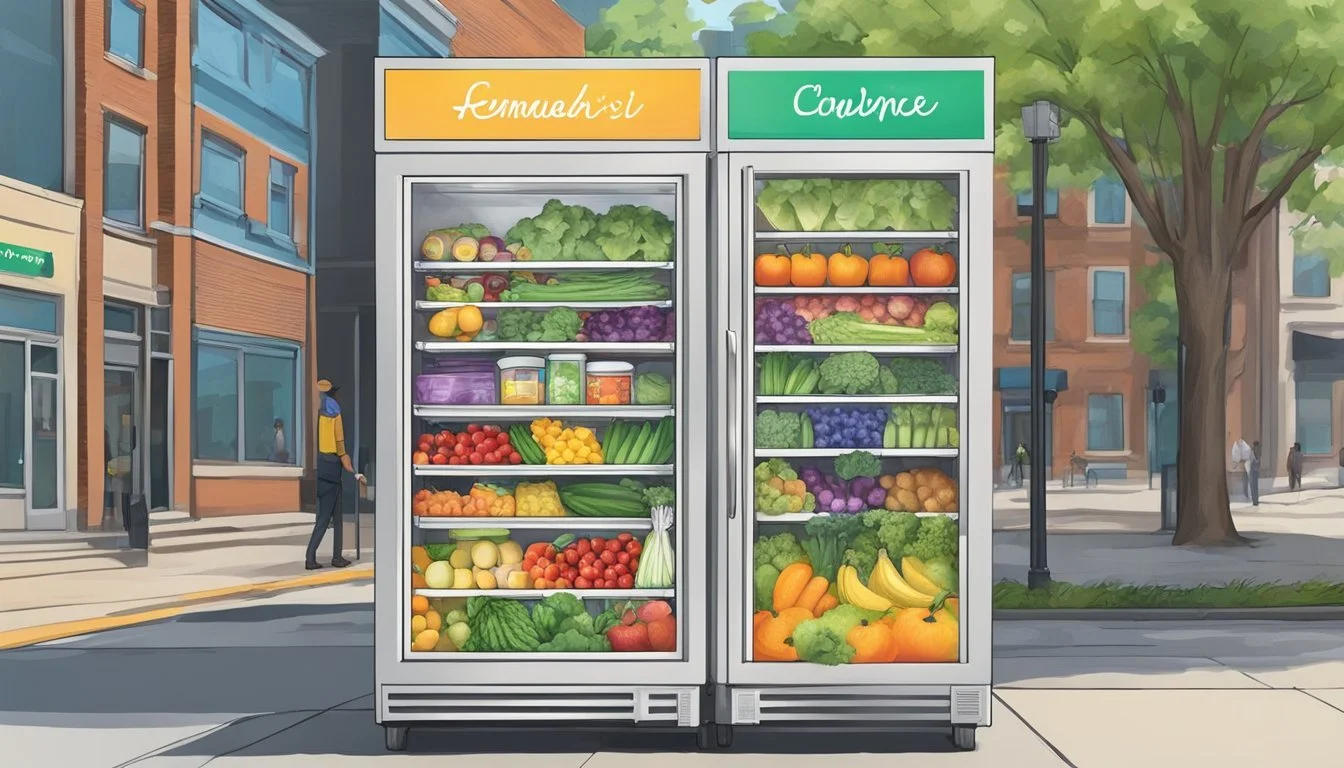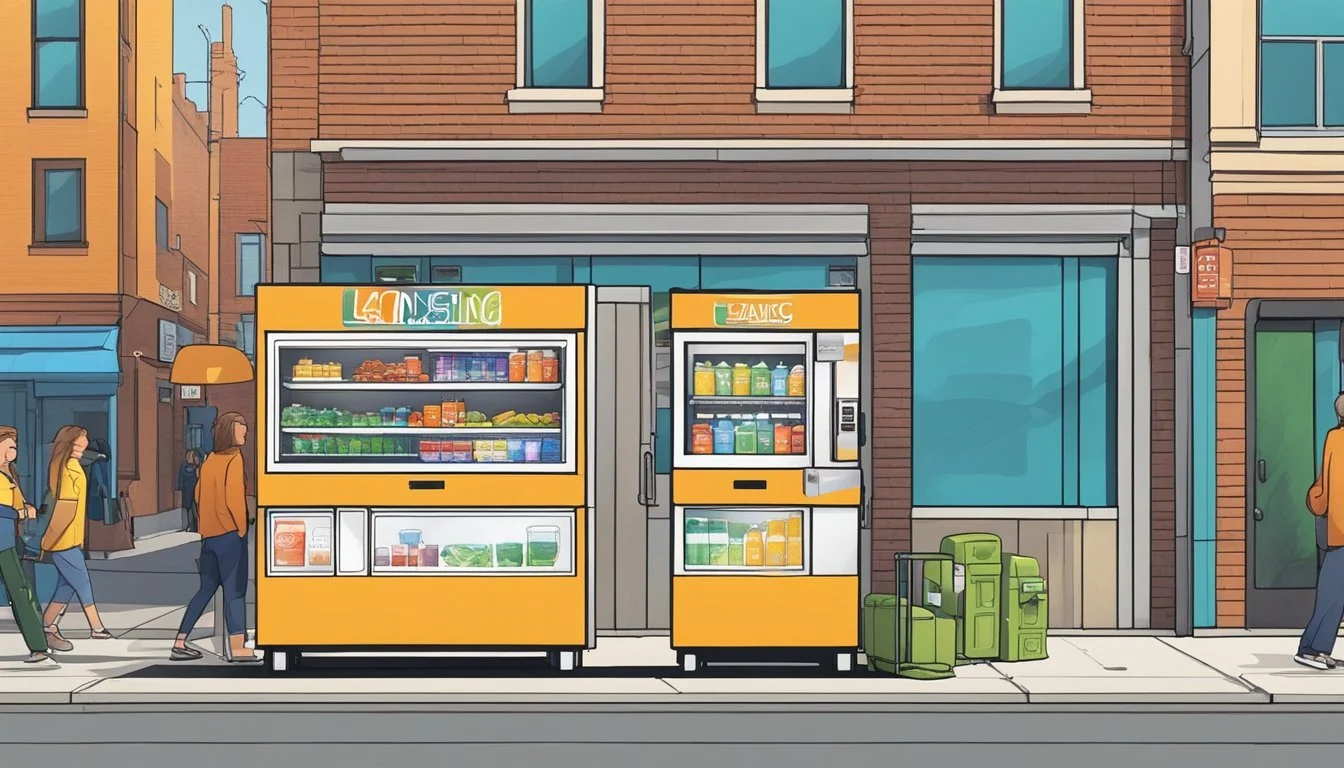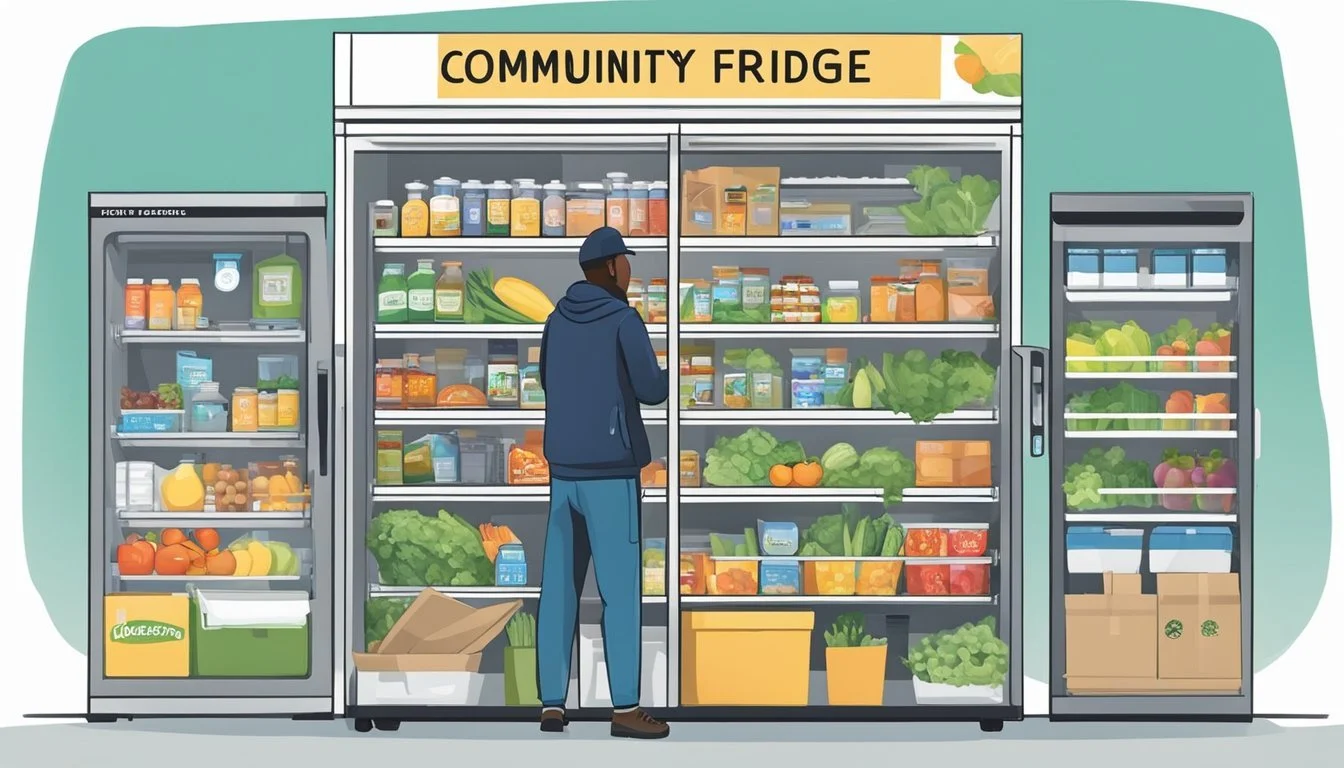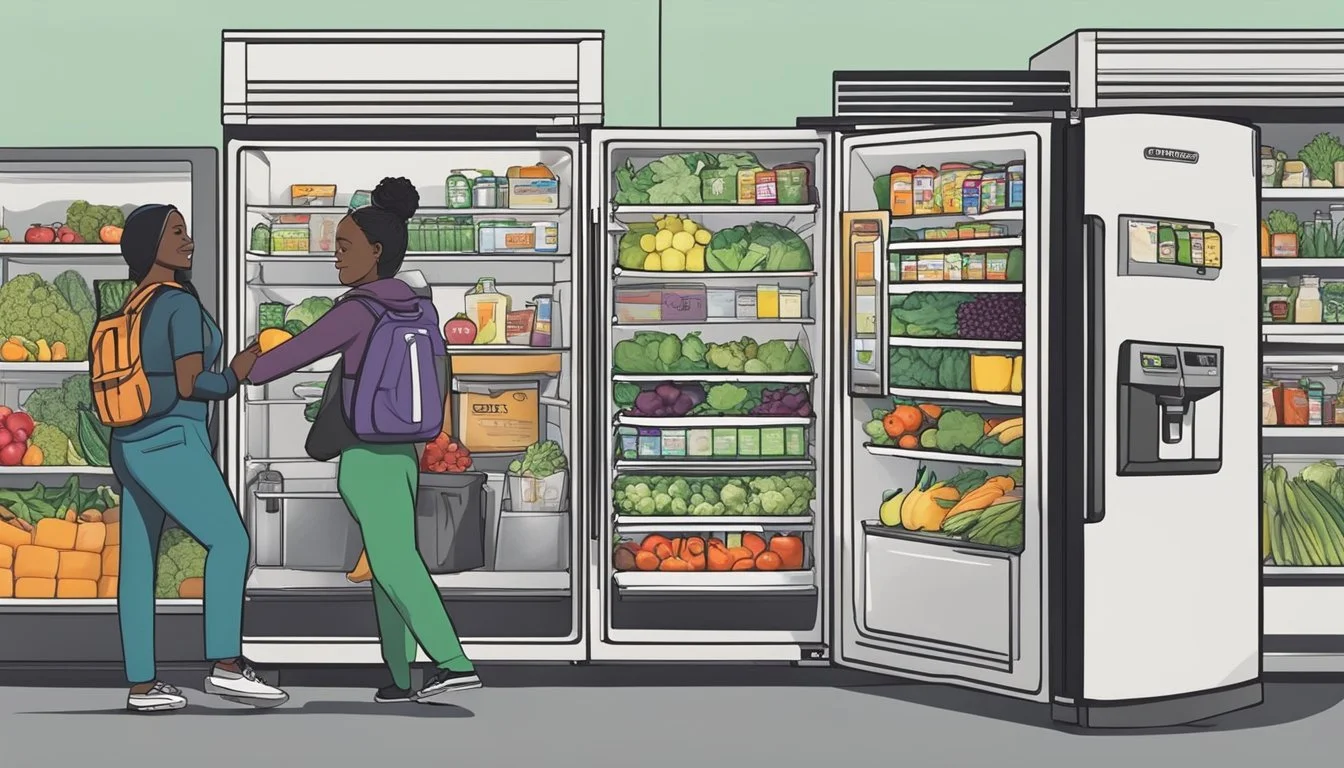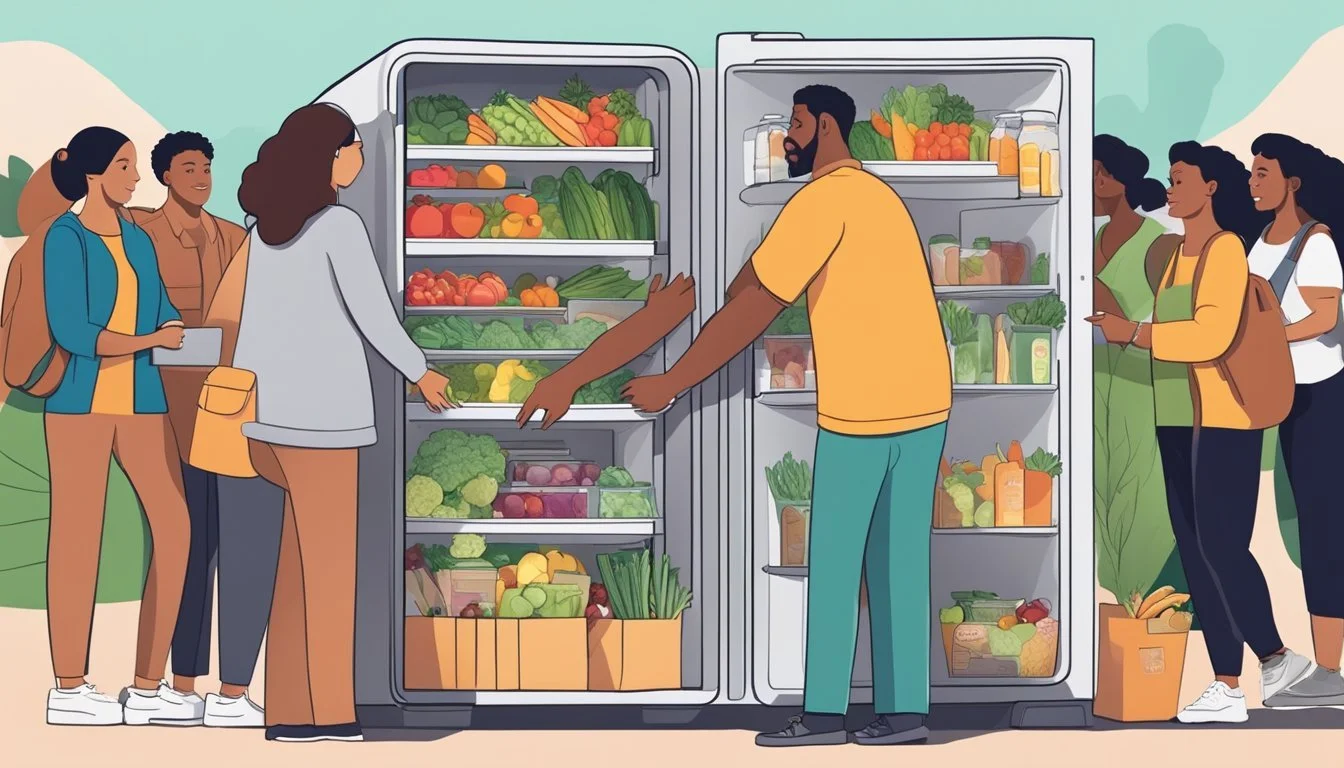Lansing, MI Community Fridge
Addressing Food Insecurity with Community Solidarity
In Lansing, Michigan, an innovative approach to addressing food insecurity and reducing waste has taken root through the establishment of community fridges. These refrigerators, placed on sidewalks within the city, serve as a symbol of mutual aid and solidarity, offering free food to anyone in need. Far from being discarded appliances, they are stocked with fresh and nutritious food items, directly challenging the stigma associated with seeking help.
The success of the Lansing community fridge initiative is a testament to the power of local collective action in the face of social issues such as environmental damage and food scarcity. Residents have come together to support each other in a very tangible way, ensuring that excess food finds its way to those who can benefit from it most, rather than ending up in landfills. This effort not only feeds the hungry but also fosters a sense of community pride and empowerment.
By embodying the principles of sustainability and compassion, the community fridges in Lansing represent a growing movement that is gaining traction across Michigan. They stand as community hubs where the fight against food insecurity intersects with environmental consciousness, showcasing the potential for small-scale interventions to have a significant impact on local communities.
History and Origin of Community Fridges
Community fridges, often found in urban areas like Lansing, Michigan, represent a grassroots response to food insecurity and environmental concerns. These refrigerators, accessible to the public, epitomize the strength of mutual aid and the combating of food waste at a community level.
Early Beginnings in Lansing
In Lansing, the introduction of community fridges traces its roots back to a broader movement that sought to blend environmental sustainability with food justice. Similar initiatives were already gaining traction in cities like New York City and Chicago, creating a template for local action. Lansing's community fridges emerged out of a desire to address local needs while adopting and adapting successful models from these cities.
Growth of Freedge Movement
The concept of community fridges in Lansing is part of the Freedge Movement, which facilitates the sharing of free food. Ernst Bertone Oehninger, associated with the University of California, is credited with founding the Freedge Movement. This innovative idea inspired many, including Emily Eicher and Alyssa Rogers, graduate students at Wayne State University. They established the Detroit Community Fridge, catalyzing the movement's expansion into other Michigan cities, including Lansing and Kalamazoo. The Freedge Network offers a collaborative platform, aspiring to nurture the establishment and growth of community fridges worldwide. The connectivity of these community fridges also aligns with the principles of the A New World in Our Hearts solidarity network, reinforcing collective care through shared sustenance and resources, fostering a strong sense of community.
How Community Fridges Address Food Insecurity
Community fridges in Lansing offer a straightforward solution to food insecurity, providing immediate access to free food while also addressing issues of waste and environmental damage.
Function and Operation of Community Frididges
Community fridges operate as public refrigeration units strategically placed in neighborhoods for easy access. These fridges are maintained by volunteers or organizations, receiving donations of food from local businesses, farms, and individuals. A typical fridge might include:
Shelves of perishable items: fruits, vegetables, dairy, and prepared meals.
Non-perishable sections: canned goods, pasta, rice, and other staples.
They operate on a simple principle: Take what you need, leave what you can. This mutual aid approach ensures constant replenishment while providing for those in need.
Impact on Local Neighborhoods
By offering free food, community fridges directly combat food insecurity within local neighborhoods. Each fridge:
Helps alleviate hunger by being accessible 24/7, requiring no forms or questions asked.
Encourages a sense of community and mutual support, as neighbors contribute to and benefit from the resource.
Addresses environmental concerns by reducing food waste as excess food is diverted from landfills to those who can use it.
Challenges and Obstacles
Despite their benefits, community fridges face certain challenges including:
Sustainability: Ensuring a consistent supply of food and operational resources is ongoing.
Weather and Vandalism: Protection from outdoor elements and misuse can be a concern.
Transportation: Individuals lacking transportation may have difficulty accessing the fridges.
Regulatory hurdles, such as health and safety regulations, can impact operations.
Community fridges are a practical approach to reducing food insecurity, waste, and environmental damage, making a tangible difference in Lansing's communities. Through collective effort and ongoing support, they represent a model of effective, affordable, and community-driven food assistance.
Locations and Accessibility
Community fridges have become an integral part of the urban landscape in Lansing, MI, aimed at tackling food insecurity by offering easy access to free food. They are strategically placed in areas where they can be of most benefit, often near social services and community care amenities.
Major Cities with Community Fridges
Most notably, Detroit has embraced the concept of community fridges, with at least four available to the public. These fridges are situated in areas like Southwest Detroit, alongside valuable community services. Additionally, cities such as Kalamazoo and Muskegon, including Muskegon Heights, have followed suit, with their own versions of community fridges to support their local populations in need.
Spread to Great Lakes Cities
The trend of community fridges is not limited to Michigan but has also spread to other Great Lakes cities, creating a network of food-sharing hubs. While not exhaustive, the presence of community fridges is noted in Benton Harbor, Niles, as well as in other Great Lakes cities beyond Michigan's borders, including Milwaukee, Madison, Cleveland, and even as far as Toronto. This regional movement serves as a testament to the increasing solidarity and mutual aid efforts across urban centers to ensure that community members have access to nutritional food.
Community Fridge Operations and Management
The Lansing Community Fridge operates through collaborative efforts and strict adherence to food safety regulations. Its management taps into volunteer support and navigates government and legal stipulations to ensure sustainable operations.
Volunteer Involvement
Volunteers are crucial for the daily operations of the Lansing Community Fridge. They undertake tasks such as:
Stocking: Ensuring the fridge is regularly filled with fresh produce.
Maintenance: Keeping the fridge clean and operational.
Monitoring: Checking for and removing any expired or unsafe food items.
Government and Legal Regulations
The fridge operates within the guidelines set by government entities and adheres to the county’s food code. It aims to comply with legitimate food code violations to maintain:
Safety: All food is stored following safety standards to prevent health risks.
Legality: Operations are structured to meet legal requirements, including handling and distribution of food.
Benefits and Challenges of Community Fridge Initiatives
The establishment of community fridge initiatives in Lansing, MI, represents a proactive approach to reducing food waste and providing resources to those in need, even as they navigate various regulatory and practical issues.
Environmental Impact
Community fridges directly combat environmental damage by repurposing working fridges and diverting edible food from landfills. The food that would otherwise contribute to waste and the emission of greenhouse gases can be repurposed to feed the hungry. For example, Lansing community fridges help in:
Reducing waste: Fresh foods that might have become rotten and disposed of are instead given a second chance to be consumed.
Conservation of resources: By giving away food, the fridges prevent the unnecessary purchase of additional food items, effectively conserving resources.
Societal Benefits
The societal benefits of the community fridge initiative are twofold:
Fighting food insecurity: These refrigerators offer free access to fresh food for individuals and families, helping alleviate poverty and hunger in the community.
Breaking down stigma: By normalizing the concept of mutual support, community fridges help to dismantle stereotypes and the stigma related to receiving aid. Anyone can give and take freely, which fosters a sense of community without judgment.
Legal and Sanitary Challenges
Despite their benefits, community fridges face legal and sanitary challenges:
Legal considerations: There are city ordinances and health code regulations that must be followed to operate such an initiative legally. Constant monitoring is required to ensure compliance with these rules.
Health and safety: Maintaining the cleanliness of the refrigerator and ensuring that food is not rotten or contaminated requires regular monitoring and oversight, which poses a challenge to the sustainability of the program.
Personal Stories and Community Impact
Community fridges in Lansing, MI have become essential platforms for charity and trust, reflecting the powerful impact of individual and organized efforts. These hubs are fueled by donations and serve as a testimony to the love and solidarity within the community.
Individual Contributions
Wayne State University graduate students played a pivotal role in introducing the community fridge concept to Michigan, particularly in the Southwest Detroit area. They, along with other local residents, observed a need for food accessibility and took action. Individuals, ranging from pre-med students to professionals in art therapy and clinical mental health counseling, have come together to ensure the fridges are regularly stocked. The fridges are replenished with donations from *all residents, including those deemed rich people and local grocery stores, emphasizing an inclusive approach where anyone can contribute.
Testimonials from Beneficiaries
Beneficiaries of the Lansing community fridges often share heartfelt gratitude, revealing the significant impact on their lives. One local resident mentioned, "It's more than just food, it's about knowing we are not alone." These community fridges offer not just nourishment but also a sense of belonging and care. Notes left by users typically express a deep thanks, showcasing how these fridges stand as bastions of support in times of need. Users particularly emphasize the absence of stigma, which can often accompany charity, thus highlighting the platform's role in maintaining the dignity of all who reach out for help.
Future Prospects of Community Fridges
The future of community fridges in Lansing hinges on integrating technology and sustainable practices to extend their reach and efficacy.
Technological Advances and Social Networks
Advancements in technology may provide significant benefits to the operation and management of community fridges. By introducing sensor technology, fridges could monitor their inventory in real time, alerting volunteers when stocks are low or when items are nearing the end of their shelf life. Limited access to technology during the coronavirus pandemic revealed the importance of connectivity. As a result, community fridges may employ platforms such as Google Sheets or specialized apps to coordinate contributions and withdrawals, enhancing efficiency. Social media has shown to be effective in rapidly disseminating information about community fridges—turning them viral—and could continue to do so, broadening visibility and support.
Social Networks Impact:
Sharing: Spread the word via platforms like Facebook, Instagram, and Twitter.
Coordination: Use technology to manage stocking and distribution.
Expansion and Sustainability
Community fridges are likely to proliferate across Lansing's sidewalks, offering effortless access to food for passersby. This could address societal issues such as food insecurity head-on. A focus on sustainability is paramount; fridges could incorporate solar power to reduce electrical costs and environmental impact. The fridges' success could soon manifest in a variety of interpretations, expanding beyond food to include necessities like hygiene products. Volunteers and organizations may prioritize building a network that is not only resilient but also adaptive to the changing needs of the community.
Sustainability Goals:
Energy: Adoption of renewable energy options.
Materials: Durable designs that reduce the need for frequent repairs.
By progressively integrating technological enhancements and sustainability practices into the community fridge initiative, Lansing residents and volunteers may look ahead to a future where addressing hunger and reducing food waste become communal achievements rooted in innovation and shared responsibility.
How to Get Involved
Community fridges in Lansing, MI, offer locals a platform to contribute to mutual aid efforts, addressing food insecurity, and promoting community spirit. Whether one wishes to start a fridge, support existing initiatives, or engage in educational outreach, multiple pathways to participation await.
Starting a Community Fridge
Individuals inspired to combat food insecurity may consider establishing a community fridge. Key steps involve securing a location, understanding ongoing costs such as the estimated $150 annual electricity cost in Atlanta, and coordinating with initiatives like the Detroit Community Fridge. It's crucial to engage with community leaders and stakeholders, such as mutual aid organizer Thadeaus Umpster, for best practices.
Supporting Existing Initiatives
To support existing community fridges, contributions can be made in various forms:
Donations: Food, financial, or equipment donations sustain operations. Organizers like Emily Eicher and Alyssa Rogers at the Lansing community fridge welcome these contributions.
Volunteering: Contributing time to restock, clean, and maintain the fridges is vital.
Promotion: Sharing the cause on social media amplifies its presence and draws in support.
Educational Outreach
Education plays a pivotal role in strengthening community fridge efforts. Entities like the Great Lakes Echo and advocates such as Kayla Nelsen emphasize the importance of:
Workshops: Hosting events to inform about food donation safety and stigma associated with hunger.
School Programs: Collaborating with schools to integrate lessons on mutual aid and community support.
Community Gardens: Encouraging local gardens to become a source of fresh produce donations can also enhance the initiative's impact.
In essence, Lansing's community fridge movement offers manifold opportunities for individuals to champion sustainability and empowerment through shared resources and education.
Conclusion
Lansing, Michigan, has witnessed the emergence of community fridges, a testament to a growing movement centered on food sharing and waste reduction. These fridges, established as part of a broader solidarity network, offer free access to food for those in need, thereby fostering a spirit of mutual aid within the community.
The operation of community fridges in Lansing is a reflection of compassion and community engagement. They serve as tangible points of support, demonstrating that acts of kindness, rooted in the principle of community love, are alive and well in urban settings.
Key Aspects of Lansing's Community Fridges:
Accessibility: The fridges are open to all, ensuring no one faces food scarcity alone.
Environmental Impact: These fridges help curb food waste by offering a place for surplus provisions.
Solidarity: They signify Lansing's commitment to a solidarity network that prioritizes communal well-being over individual gain.
The model of the community fridge in Lansing could serve as a blueprint for other cities, showcasing how local initiatives can make a significant difference in tackling societal issues such as food insecurity. As these fridges become a staple in the urban landscape of Lansing, they mirror the city's dedication to inclusive, environmentally conscious, and compassionate community development.

